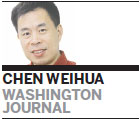As "Occupy Central" protesters demand a universal suffrage that they claim would be more representative, it could be argued that the election process in the United States is not any more democratic than Hong Kong's.
Americans voters will turn out Tuesday for the midterm congressional elections, with the prospect that the Republicans could wrest control of the Senate from the Democrats and take control of both chambers of Congress. 
If the GOP succeeds by late Tuesday evening, President Barack Obama will be dealt a heavy blow for his last two years in the Oval Office.
In Hong Kong, the China National People's Congress Standing Committee has endorsed an election committee of 1,200 members to pick the candidates to run for chief executive of the Hong Kong Special Administrative Region government.
Lawrence Lessig, a professor at Harvard Law School and director of its Safra Center for Ethics, said that any candidate who wants to run for the US Congress knows he has to raise a tremendous amount of money.
"Who are the funders of that campaign?" Lessig asked. "It's a tiny, tiny fraction of America, maybe about 0.05 percent of the relevant funders of campaigns," Lessig told the GPS program on CNN hosted by Faria Zakaria, which aired on Sunday.
Lessig described the US system as similar to the one in Hong Kong, a two-stage process. "And at the first stage, a tiny fraction of our democracy chooses the candidates who get to run, effectively, in the second stage," he said.
"Well, just imagine you spend 30 to 70 percent of your time calling these funders, this tiny fraction of the 1 percent, to raise the money you need to fund your campaigns," Lessig said. "It would develop in you a sixth sense, a constant awareness, about how what you do will affect your ability to raise money. Your focus is on the funders and not on the people," said Lessig, who has researched and written extensively on political corruption in the US.
"And the point is, if the funders are not the people, which they are not when they are this tiny fraction of the 1 percent, it can't help but corrupt the way our government functions."
Lessig's 2011 book Republic, Lost: How Money Corrupts Congress - and a Plan to Stop It, has been described by some as a manifesto for the "Occupy Wall Street" movement three years ago. It focuses on corruption in both the Republican and Democratic parties and the elections.
The "Occupy Wall Street" movement swept across major US cities under the premise that it was fighting for the rights of more than 99 percent of the citizenry in a country whose politics and wealth were controlled by the other 1 percent, with strong ties to Wall Street.
Obama, despite spending an enormous amount of time and effort in political fundraising over the years, has on several occasions expressed his disgust for the role of money in US politics.
Negative campaign ads financed by a small group of political donors have become more prominent in US presidential and midterm elections.
Obama has been criticized for making political appointments for ambassador and his cabinet from among his campaign patrons.
The revolving-door phenomenon in Washington has been regarded by many, including Lessig, as a reflection of corrupt politics in the US.
K Street in Washington is notoriously known as a place for lobbyists in so-called consulting or public relations firms or think tanks, founded, headed, staffed or advised often by people who were former heavyweights in the US government, military or Congress. They include former secretaries of state, Pentagon chiefs and key members of the Senate and House.
To many Chinese observers, the multibillion-dollar lobby industry, where former officials and lawmakers use their prior connections to influence politics for personal gain, is sheer corruption. And many were startled to learn that it is legal in the US.
While the low approval ratings - 10 percent for Congress and 40 percent for Obama - might reveal the condition of US politics, the universal suffrage package endorsed by the NPC Standing Committee unarguably reflects major progress in Hong Kong's move toward a more representative local government.
When Hong Kong was under British rule before 1997, all of its governors were appointed by the British, without any consultation or participation of Hong Kong's people.
Some say that a gradual approach to full democracy, as being practiced in Hong Kong, is a move in the right direction. The call for an end of the "Occupy Central" movement and the restoration of order, signed by more than 1 million Hong Kong residents recently, demonstrates that Hong Kong public opinion is largely and deliberately ignored by mainstream US media and politicians.
Contact the writer at chenweihua@chinadailyusa.com.
(China Daily USA 11/04/2014 page2)
